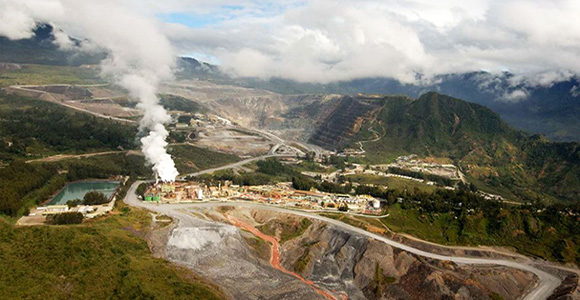After over three decades, Papua New Guinea’s government seems to be speaking a different language: one that calls for greater benefits into government coffers and landowner pockets, says journalist Scott Waide. He explains why resource projects have come under scrutiny recently and what it means for landowners.
Early last month, senior ministers, including Petroleum Minister Fabian Pok, travelled to Komo in Hela province for meetings with landowners of the gas project.
After 15 years, there has been some progress—or at least that’s the positive spin to it. There appears to be some indication that royalties that have been locked away due to legal battles and tangled by bureaucratic red tape were going to be paid, but only after landowner identification processes.
In February, former Finance Minister James Marape told the media that K300 million is parked at the Central Bank, ready to be released. Landowners—or people claiming to be landowners—have to follow a process of ‘landowner identification’ to be paid that money.
There is some hope of an end to disputes, but the final settlement is still a long way off. That’s the reality. Many of the elders have died waiting for the royalty payments they were promised.
‘The general thinking from the national government is that a profit-based tax can be deceptive, leaving the government with very little to collect when a mining company declares losses or breaks even.’
Hela become a new province in 2012. Its provincial government still has to work its way through layers of bureaucratic processes that continue to favour the Southern Highlands in terms of royalty payments from the gas project.
Remembering our history
It’s all that and a lot more. Understanding the background to the complexities of the resource project in Hela means going back some 20 years.
At that time, oil extraction ended and the promise of PNG becoming the Saudi Arabia and Dubai of the Pacific faded as the crude oil taps shut off.
It is against that backdrop that the neighbouring Enga province is looking at the Porgera mine’s renegotiation through a wardens hearing. This is a process that has been reopened after the end of a mining lease.
Landowners and the Enga provincial government are looking at a bigger slice of revenues and benefits. What did they get over the last 30 years? That’s a point of contention for pro-mining and anti-mining proponents.
What is visible to the international community is that there have been campaigns against alleged atrocities committed against local people in Porgera. There has also been a desperate push by locals to get what crumbs they can from a mine that has existed for 30 years on their land.
For the first time in over three decades, it seems that the government is speaking a different language: one that calls for greater benefits into government coffers and landowner pockets.
This has come after 30 years of gold extraction, 500 shipments of liquefied natural gas and billions of dollars worth of round log exports.
Opportunity for renegotiation
In Lae, during the opening of the Central Bank’s Currency Processing Facility, Deputy Prime Minister Charles Abel talked about a production-based tax instead of a profit-based tax for resource projects that will be signed from 2019 onwards.
‘The Hela provincial government still has to work its way through layers of bureaucratic processes that continue to favour the Southern Highlands in terms of royalty payments from the gas project.’
The general thinking from the national government is that a profit-based tax can be deceptive, leaving the government with very little to collect when a mining company declares losses or breaks even.
A similar process to what is happening in Porgera is occurring in Madang. Triggered by an agreement between China and PNG, the Ramu nickel’s expansion is subject to an ongoing discussion between the PNG government and the developer.
The processes are long and drawn out. Without proper representation landowners could be left with another raw deal for several more decades, before another opportunity for renegotiation presents itself.
Scott Waide is a journalist based in Lae. This story was first published in his blog.











Speak Your Mind